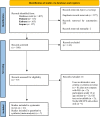A systematic review and meta-analysis of urinary biomarkers in myalgic encephalomyelitis/chronic fatigue syndrome (ME/CFS)
- PMID: 37408028
- PMCID: PMC10320942
- DOI: 10.1186/s12967-023-04295-0
A systematic review and meta-analysis of urinary biomarkers in myalgic encephalomyelitis/chronic fatigue syndrome (ME/CFS)
Abstract
Background: Myalgic Encephalomyelitis/Chronic Fatigue Syndrome (ME/CFS) is a multifactorial illness that affects many body systems including the immune, nervous, endocrine, cardiovascular, and urinary systems. There is currently no universal diagnostic marker or targeted treatment for ME/CFS. Urine is a non-invasive sample that provides biomarkers that may have the potential to be used in a diagnostic capacity for ME/CFS. While there are several studies investigating urine-based biomarkers for ME/CFS, there are no published systematic reviews to summarise existing evidence of these markers. The aim of this systematic review was to compile and appraise literature on urinary-based biomarkers in ME/CFS patients compared with healthy controls.
Methods: Three databases: Embase, PubMed, and Scopus were searched for articles pertaining to urinary biomarkers for ME/CFS compared with healthy controls published between December 1994 to December 2022. The final articles included in this review were determined through application of specific inclusion and exclusion criteria. Quality and bias was assessed using the Joanna Briggs Institute Critical Appraisal Checklist for Case Control Studies. A meta-analysis according to Cochrane guidelines was conducted on select studies, in particular, those that investigate urinary free cortisol levels in ME/CFS patients compared to healthy controls using the program STATA 17.
Results: Twenty-one studies were included in this review. All of the studies investigated urinary-based markers in ME/CFS patients compared with healthy controls. The reported changes in urinary outputs include urinary free cortisol (38.10%), carnitine (28.6%), iodine (4.76%), and the metabolome (42.86%). In most cases, there was minimal overlap in the main outcomes measured across the studies, however, differences in urinary free cortisol between ME/CFS patients and healthy controls were commonly reported. Seven studies investigating urinary free cortisol were included in the meta-analysis. While there were significant differences found in urinary free cortisol levels in ME/CFS patients, there was also substantial heterogeneity across the included studies that makes drawing conclusions difficult.
Conclusions: There is limited evidence suggesting a consistent and specific potential urinary-based biomarker for ME/CFS. Further investigations using more standardised methodologies and more stringent case criteria may be able to identify pathophysiological differences with diagnostic potential in ME/CFS patients compared with healthy controls.
© 2023. The Author(s).
Conflict of interest statement
The authors declare that they have no competing interests.
Figures


Similar articles
-
Exercise therapy for chronic fatigue syndrome.Cochrane Database Syst Rev. 2024 Dec 19;12(12):CD003200. doi: 10.1002/14651858.CD003200.pub9. Cochrane Database Syst Rev. 2024. PMID: 39697147
-
Systemic treatments for metastatic cutaneous melanoma.Cochrane Database Syst Rev. 2018 Feb 6;2(2):CD011123. doi: 10.1002/14651858.CD011123.pub2. Cochrane Database Syst Rev. 2018. PMID: 29405038 Free PMC article.
-
A systematic review of nutraceutical interventions for mitochondrial dysfunctions in myalgic encephalomyelitis/chronic fatigue syndrome.J Transl Med. 2021 Feb 17;19(1):81. doi: 10.1186/s12967-021-02742-4. J Transl Med. 2021. PMID: 33596913 Free PMC article.
-
Systemic pharmacological treatments for chronic plaque psoriasis: a network meta-analysis.Cochrane Database Syst Rev. 2021 Apr 19;4(4):CD011535. doi: 10.1002/14651858.CD011535.pub4. Cochrane Database Syst Rev. 2021. Update in: Cochrane Database Syst Rev. 2022 May 23;5:CD011535. doi: 10.1002/14651858.CD011535.pub5. PMID: 33871055 Free PMC article. Updated.
-
Systemic pharmacological treatments for chronic plaque psoriasis: a network meta-analysis.Cochrane Database Syst Rev. 2020 Jan 9;1(1):CD011535. doi: 10.1002/14651858.CD011535.pub3. Cochrane Database Syst Rev. 2020. Update in: Cochrane Database Syst Rev. 2021 Apr 19;4:CD011535. doi: 10.1002/14651858.CD011535.pub4. PMID: 31917873 Free PMC article. Updated.
Cited by
-
Immunometabolic changes and potential biomarkers in CFS peripheral immune cells revealed by single-cell RNA sequencing.J Transl Med. 2024 Oct 11;22(1):925. doi: 10.1186/s12967-024-05710-w. J Transl Med. 2024. PMID: 39394558 Free PMC article.
-
Recent Research Trends in Neuroinflammatory and Neurodegenerative Disorders.Cells. 2024 Mar 14;13(6):511. doi: 10.3390/cells13060511. Cells. 2024. PMID: 38534355 Free PMC article. Review.
-
Steroid dynamics in myalgic encephalomyelitis / chronic fatigue syndrome: a case-control study using ultra performance supercritical fluid chromatography tandem mass spectrometry.J Transl Med. 2025 Jul 25;23(1):829. doi: 10.1186/s12967-025-06841-4. J Transl Med. 2025. PMID: 40713801 Free PMC article.
-
Machine learning and multi-omics in precision medicine for ME/CFS.J Transl Med. 2025 Jan 14;23(1):68. doi: 10.1186/s12967-024-05915-z. J Transl Med. 2025. PMID: 39810236 Free PMC article. Review.
References
-
- Carruthers BM, Jain AK, De Meirleir KL, Peterson DL, Klimas NG, Lerner AM, et al. Myalgic Encephalomyelitis/Chronic Fatigue Syndrome. J Chronic Fatigue Syndrome. 2003;11(1):7–115. doi: 10.1300/J092v11n01_02. - DOI
Publication types
MeSH terms
Substances
LinkOut - more resources
Full Text Sources
Medical

